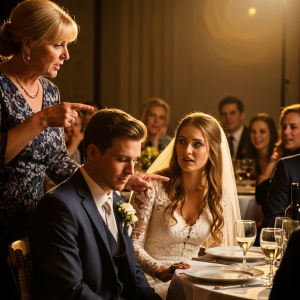I come from what you’d call a close-knit family, but that term does a lot of heavy lifting. It’s me, my younger brother, and my younger sister, Bonnie. My brother and I are tight. But Bonnie… that’s where things get complicated. Growing up, she was the golden child, the baby of the family who could do no wrong in our parents’ eyes. While we were expected to be responsible, Bonnie got away with murder. This created a rift between us that only grew wider as she got older. Her sense of entitlement is off the charts.
Earlier this year, I hit the jackpot at work—a bonus that made my eyes pop. My first thought was to do something nice for my family. Our parents’ anniversary was coming up, so I had a brilliant idea: a week-long, all-expenses-paid trip to Hawaii, where they went on their honeymoon.
My parents were overjoyed. My mom teared up, and my dad, though trying to play it cool, was over the moon. My brother gave me a bear hug and immediately started planning activities. And then there was Bonnie. To my surprise, she seemed genuinely thrilled. For a moment, I thought this trip might actually bring us all closer. Oh, how naive I was.
The problems started almost immediately. Bonnie, in her typical fashion, decided that since I was footing the bill, she should be in charge of planning. She didn’t ask; she demanded. “You’re not good at planning stuff,” she told me. “Just hand it over to me.”
I know my sister. When someone else is paying, Bonnie has champagne taste. I tried to explain to my parents that the activities were meant to be a surprise, but Bonnie wasn’t having it. Desperate to keep the peace, I eventually caved and gave her the itinerary. Big mistake.
The moment Bonnie got her hands on the schedule, she went into full control-freak mode. She announced in the family group chat that she had “taken over” the planning. A week before the trip, I logged into my account to double-check some details and my jaw hit the floor. Bonnie had canceled several activities I had booked—things I knew everyone would love—and replaced them with her own preferences.
I was livid. This was my gift to the family, and she had completely hijacked it. I called her, trying my best to keep my cool. Her response was infuriating. “I’m better at planning,” she insisted. “You should be grateful I’m helping.” She accused me of being controlling and hung up on me.
That night, my parents called, clearly having heard Bonnie’s sob story. It quickly became clear whose side they were on. “Bonnie’s just excited about the trip,” they said. “You should let her have some control over it.” They didn’t seem to grasp, or care, that she had completely disregarded my efforts and my money.
Then, two days before we were set to leave, I received a notification: my tickets had been canceled. I called the airline, only to be told the cancellation had come from my account. I knew immediately who was behind this.
I called Bonnie. She had the audacity to act like nothing was wrong. When I confronted her, she giggled. “Oh yeah,” she said, not sounding sorry at all. “I know you were funding it and blah blah blah, but we can’t have you on the trip, dude. You’re too controlling, and your negative vibes would ruin the vacation for everyone. I discussed this with everyone, and the family has agreed to dump you.”
I couldn’t believe what I was hearing. The trip that I had paid for, that I had planned as a gift, was now happening without me. In that moment, something in me snapped. Without saying another word, I hung up, logged back into my account, canceled her ticket, and rebooked it in my name. Then, I changed the password.
I typed out a message to the family group chat: Since Bonnie has decided I’m not welcome on the trip I paid for, I’ve canceled her ticket. If any of you wants to stay with her, I’ll be happy to cancel your tickets too.
The fallout was immediate. My brother called, swearing he had no idea about Bonnie’s plan. According to him, she had made the whole thing up. Then my parents called, furious that I had canceled Bonnie’s ticket. They swore they had never asked her to do that, but they weren’t thrilled with my retaliation.
My dad, offering to mediate, set up a conference call. He added Bonnie to the line, but she was too angry to realize it. Before Dad could even finish telling her she needed to apologize, Bonnie exploded.
“Apologize to that jerk? My butt!” she snapped. “I did the right thing! He was going to ruin everything with his controlling attitude!”
There was a long, awkward silence. I could practically hear the gears turning in my dad’s head as he realized they had been enabling Bonnie’s behavior all these years. He hung up the call. When I called him back, I asked him, “Do you now see how cruel your daughter is, or do you still want me to take her on this trip?” He was quiet for a long moment before saying, “I’m torn between two of my children. I don’t know what to do.”
The day of the trip was tense. My brother was excited, but my parents looked like they were heading to a funeral. As we boarded the plane, I could feel the weight of their disappointment. But once we landed in Hawaii, things started to turn around. Slowly, I could see my parents starting to relax and enjoy the trip I had planned.
Of course, Bonnie couldn’t let us have one nice thing. Throughout the week, my phone was constantly buzzing with angry messages from her, swinging wildly between rage and self-pity. My parents checked in with her occasionally, but even they were starting to see through her act. By the end of the trip, they admitted they had a wonderful time and even thanked me for my efforts.
When we got back, I discovered Bonnie had blocked me on all social media. She was furious with our parents for choosing me over her and threatened to cut them off, which was a hollow threat considering she still lived in their house rent-free. She declared she never wanted to see me again. And you know what? I was okay with that.
A few months passed. I swung by my parents’ place for dinner and noticed something was off: Bonnie’s beat-up Volkswagen was gone. When I went inside, her room was completely empty. My parents looked lighter, like a weight had been lifted.
Turns out, they had finally done what they should have done years ago: they’d cut the cord.
After we got back from Hawaii, Bonnie’s drama had ramped up. She screamed at our parents about how they’d abandoned her. When they gave her the gifts we’d brought back, she literally threw them back in their faces. That was the last straw for my dad. He told her to pack her bags.
Realizing she’d finally pushed too far, Bonnie did a complete 180, crying and promising she’d do better. But my parents had finally wised up. They stood firm, helped her find a small apartment, and even paid the first two months’ rent.
Of course, Bonnie hadn’t paid a single month’s rent since. She’d been dodging her landlord, couch-surfing, and mooching meals off our parents. When my dad finally reached his limit, he told her she was on her own. No more bailouts.
Bonnie tried every trick in her book: crying, pleading, guilt-tripping. She even called my brother, asking him to borrow money from me to give to her because asking me directly would “boost my ego.” My brother, showing incredible patience, told her to swallow her pride and ask me herself. Her response was to call him my “bootlicker.”
Six blissful, drama-free months passed. Then, one Sunday afternoon, there was a knock at the door. It was Bonnie. She looked like she’d been through hell.
“Daddy,” she said, “I’m home.”
My dad didn’t flinch. He stood there, blocking the doorway. “No, Bonnie. You’re not.”
Her face crumpled. She tried to push past him, but he stood firm. Then the waterworks started. “I have nowhere else to go!” she wailed. “They’re going to arrest me if I don’t pay my rent! Don’t you love me anymore?”
I had enough. I stood up and walked to the door. “No,” I said, looking her straight in the eye. “This is between you and all of us. You don’t get to waltz back in here and pretend the last year didn’t happen. You made your choices, Bonnie. Now you have to live with them.”
“Fine!” she spat, her tears instantly gone. “I see how it is. You’ve all turned against me. Well, I don’t need any of you!”
She turned on her heel and stormed off. We all just stood there in silence. Then, my mom burst into tears, and my dad wrapped her in a hug. As I drove home that night, I couldn’t help but chuckle.
For weeks after Bonnie stormed away from my parents’ doorstep, I half-expected her to reappear—either with a suitcase, an outrageous sob story, or maybe both. But nothing. Just an eerie, blissful quiet.
My parents didn’t talk about her much. My brother and I didn’t ask. It was as if the collective unspoken agreement was: If Bonnie wants to light her own bridges on fire, let her.
And honestly? The peace was intoxicating.
For the first time in decades, family dinners were… calm. My parents weren’t anxiously tiptoeing around potential blowups. My mom laughed more. My dad told stories without being interrupted by Bonnie dramatically sighing that he was “hogging the spotlight.”
It was surreal.
Of course, Bonnie didn’t stay silent forever.
Her first line of attack wasn’t direct—it was through “mutual friends” and extended family members who suddenly became her flying monkeys.
I started getting texts from distant cousins:“Hey, I heard you banned your own sister from the family? That’s not cool.” “She’s been through a lot. Maybe you could reach out?”
My personal favorite came from Aunt Denise, who hasn’t sent me a birthday card in fifteen years: “Family is forever. If she’s struggling, you should be the bigger person and help her.”
I replied once:“I was the bigger person. I paid for Hawaii.”
After that, I stopped engaging. Let them think what they wanted. The people whose opinions mattered had been on the plane with me, eating pineapple pancakes under the Hawaiian sunrise.
One evening, I was chopping vegetables when my phone lit up with an unknown number. It was a guy named Rick, who turned out to be Bonnie’s former landlord.
“She gave me your number,” he said, “told me you’d cover her back rent.”
I almost sliced my finger. “Come again?”
“She said you’re the responsible sibling, and family takes care of family. She owes three months and I’m trying to work something out before legal action.”
I laughed—out loud. Poor Rick. He was in over his head.
“Rick, I’m not covering Bonnie’s rent,” I said plainly. “In fact, you might want to stop letting her hand out other people’s numbers like that.”
There was a long pause. “…Ah. Got it. Thanks for the honesty.”
I hung up, shaking my head. Bonnie hadn’t changed. She’d just found new ways to outsource her mess.
A month later, I got a Facebook friend request from Bonnie. No message—just the request. I ignored it.
Three days later, she texted: “Heyyy. Long time no see. We should talk.”
No apology. No acknowledgment of Hawaii. Just a casual we should talk, like the last year had been a minor misunderstanding over who borrowed whose sweater.
When I didn’t respond, she sent: “Wow. So this is it, huh? You’re really going to throw away family over ONE TRIP?”
I didn’t bother pointing out it wasn’t just one trip—it was a lifetime of her treating everyone like background characters in the “Bonnie Show.”
What surprised me most wasn’t Bonnie’s behavior—it was my mom’s.
Historically, she’d been Bonnie’s biggest defender. “She’s just young.” “She’s finding herself.” “She doesn’t mean it.”
But now, there was a subtle change.
One Sunday dinner, she sighed and said, “I think your sister’s run out of excuses.”
I froze mid-bite. Mom never said things like that.
“She’s thirty, for heaven’s sake,” Mom continued. “At some point, she has to decide if she’s going to grow up.”
It wasn’t a disowning, but it was a crack in the wall of unconditional defense Bonnie had hidden behind for years.
Bonnie’s next move was to hijack my dad’s birthday.
We’d planned a low-key backyard barbecue—just family, a couple neighbors, nothing dramatic. Bonnie wasn’t invited. We’d agreed it was better that way.
But an hour into the party, guess who rolled up in her beat-up Volkswagen, blasting music loud enough to rattle the grill?
She strutted in like she was the guest of honor, holding a grocery store cake in one hand and her phone in the other, filming herself for Instagram.
“Surprise! The party can start now!” she announced.
The air went cold. My dad, bless him, didn’t miss a beat. He took the cake from her hands, set it on the picnic table, and said, “Thanks, Bonnie. You can grab a plate on your way out.”
The look on her face—pure disbelief. “You’re kicking me out? On your birthday?”
“Yes,” Dad said simply.
She stormed off, muttering about how ungrateful we all were.
We still ate the cake. It was decent.
If anyone had a longer patience streak than my parents, it was my brother. He’d always been the peacekeeper, the one who’d try to mediate.
But one afternoon, he called me, fuming. Bonnie had shown up at his apartment unannounced, claiming she “just needed a shower and a nap.” That turned into her eating half his groceries, “borrowing” his spare key, and inviting a friend over without asking.
When he confronted her, she called him “pathetic” and accused him of “turning into” me—apparently her ultimate insult.
He told her to leave and not come back. That was the end of their contact for a while.
Out of nowhere, Bonnie revived the family group chat.
Bonnie: “I’ve been thinking a lot lately. I want to start fresh. Can we all meet for dinner?”
Me: “Define ‘start fresh.’”
Bonnie: “Like… move on. Forget the past. Hawaii was a misunderstanding.”
Me: “You canceled my ticket and lied about everyone agreeing. That’s not a misunderstanding. That’s sabotage.”
She left the chat immediately after.
Six months after getting booted from my parents’ house, Bonnie’s living situation imploded. Her landlord finally evicted her. She’d been couch-hopping for weeks when she tried, once again, to slide back into my parents’ guest room.
But by now, even they were immune to the guilt trips.
“You need to stand on your own two feet,” my dad told her. “We’ll help you find resources, but you’re not moving back in.”
She didn’t take it well. Slammed doors. Screaming about betrayal. The usual.
Through all this, my own life was quietly thriving. Work was going great, my relationship was steady, and without Bonnie’s chaos consuming every family interaction, I actually had the mental space to focus on my own goals.
I started planning another trip—this time with just my brother and a couple close friends. Somewhere Bonnie couldn’t touch.
The last time I heard from Bonnie was a voicemail, two minutes long. It started with her crying, morphed into her yelling, and ended with:
“One day you’ll regret this when I’m gone!”
I didn’t call back. My brother didn’t call back. My parents didn’t call back.
Here’s what I’ve learned: some people never grow up because they’ve never had to. Bonnie’s entire identity was built on being rescued—by my parents, by me, by whoever she could hook at the time.
The minute we all stepped back, she was forced to face the reality she’d been avoiding for decades.
Whether she rises to the challenge or sinks… well, that’s on her now.




